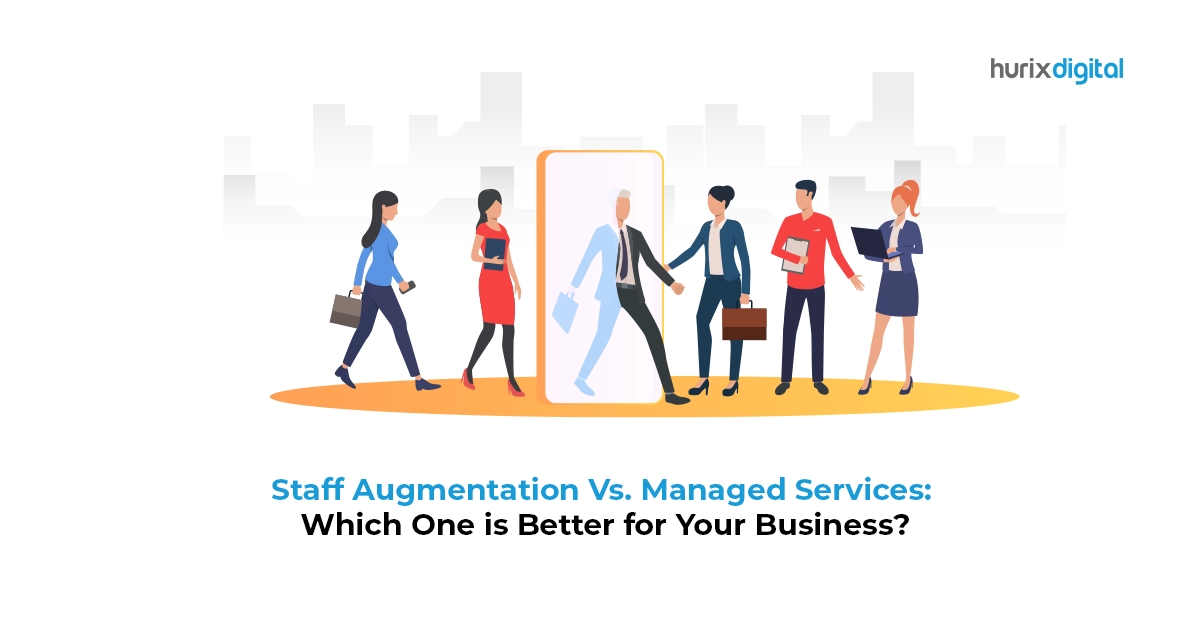Summary
This article provides a brief overview of staff augmentation and managed services and their benefits.
The cost of hiring technology professionals is an increasingly expensive, time-consuming process. Companies engage in the recruiting process due to a high rate of attrition or during phases of quick expansion.
Research indicates that the industry average for attrition is 23% because the most skilled professionals continuously seek opportunities and are in demand.
According to a survey by the Society for Human Resource Management (SHRM), the average cost of hiring is $4,700. However, experts estimate that, in reality, recruiting costs amount to three to four times the salary offered by the respective position. This is due to the time and effort invested in interviews and other recruitment-related activities, which takes away from critical activities related to fulfilling business goals.
In this scenario, companies can benefit from implementing strategic staffing solutions that reduce costs and increase Return On Investment (ROI). For instance, staff augmentation and managed services are two popular IT outsourcing models that companies can consider.
Companies grapple with a common challenge – Staff Augmentation vs. managed Services – which is the right option for their business? Let’s understand the benefits of these options and how companies can make informed decisions when choosing their recruitment path.
Table of Contents:
- Staff Augmentation vs. Managed Services Simplified
- Choosing the Right IT Outsourcing Models
- Popular Use Case – Cloud Infrastructure Management
- Benefits of IT Outsourcing
- Conclusion
Staff Augmentation vs. Managed Services Simplified
Let’s understand more about these business strategies and their unique approaches.
Staff Augmentation
Staff augmentation is a recruitment strategy where a business hires professionals on a project/ contract basis to bridge temporary or urgent capacity demands.
The business is directly involved in the hiring, onboarding, and management of contract/ freelance workers and will work closely with them to have their demands met.
Companies may leverage cloud-based, AI-driven recruitment tools to make the hiring process efficient, data-driven, and cost-effective.
Managed Services
Managed services is a business strategy where a company outsources an entire function or set of functions to an external specialist with relevant skills, expertise, and capabilities.
Companies may need managed services when they require specific expertise and do not have the means to build it from scratch. Alternatively, they may tap managed services when they need additional support in an existing function.
In this case, the business does not need to hire themselves. Instead, they work with third parties with the expertise and capabilities to meet their specific business goals.
Choosing the Right IT Outsourcing Models
The IT sector is experiencing a unique trend. When a company wins a new business contract, it needs to fulfill demands at scale and with speed. To achieve their goal and targets, they need to expand teams quickly. Once the project is complete, they may need to scale down the teams just as fast to cut costs.
Another scenario is when an IT company needs to work with new technologies they lack expertise. Building permanent teams from scratch is an expensive proposition. Companies may also be unsure whether the requirement will be ongoing or temporary.
In such scenarios, businesses must consider using relevant IT outsourcing models such as managed services to meet their needs. By doing so, they can manage costs and meet business goals efficiently.
Popular Use Case – Cloud Infrastructure Management
Today, almost every IT business – from financial analysis software companies to mobile apps – leverages the cloud as part of their business model. Building and managing the cloud from scratch is an expensive, time-consuming effort.
Not all companies have expertise in cloud computing. However, they must invest in the cloud to build their products and services. A strategic approach would be for companies to outsource cloud services end-to-end, thus reducing costs and efforts to maintain it.
By partnering with a cloud services specialist, they can fulfill cloud requirements. Internal teams can concentrate their bandwidth on building innovative products and services.
Also Read: How can the latest technology help in Staff Augmentation Services?
Benefits of IT outsourcing
Let’s understand the benefits of effective IT outsourcing:
1. Higher Operational Efficiency
Businesses can outsource their entire requirement per the scope of their real-time needs, thus eliminating their involvement in hiring processes. Technology leaders can focus on higher-value tasks. Superior IT sourcing partners leverage AI tools to bring efficiency to projects and enable companies to make data-driven decisions.
2. Scale Up or Scale Down Quickly
Businesses can scale up or down their requirements within a brief window, thus enabling them to meet market requirements and, in turn, their business goals. Just as they do not need to be engaged in the hiring process, they do not need to be involved in the termination of services, which is costly and time-consuming.
3. More Accountability
IT outsourcing partners will institute in-depth and proactive monitoring and reporting protocols to ensure the smooth running of projects. All processes are pre-defined to ensure smooth function. For instance, incident management will follow a process to ensure there are no security-related incidents that can compromise efforts.
4. Bridging All Technology Gaps
Companies can bridge technology gaps at scale and with speed and accuracy. An IT outsourcing partner that brings the right technology capabilities and constantly innovates to solve problems helps companies surpass business goals and deliver more value to customers.
5. Cost Optimization
Using technologies like automation and AI enables outsourcing partners to offer a cost advantage to businesses seeking cost-effective solutions. Your IT outsourcing partner will also continuously analyze costs and develop innovative ways to cut expenses. The onus would be on them to offer high-quality services at a cost-efficient price.
Also Read: Why Staffing Solutions are Crucial for Business Excellence?
Conclusion
By leveraging IT management services, companies have more control, flexibility, convenience, and accountability in projects. The entire effort of hiring is eliminated, thus enabling technology leaders to offer their full commitment to delivering on business goals.
Companies can partner with a managed services technology specialist with expertise and bandwidth to do justice to any project.
If your business needs to outsource critical IT functions, then Hurix Digital is geared to support you in meeting your needs.
Get in touch with us to start a conversation.











